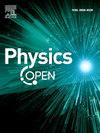加入磁单极子的耦合经典谐振子的特殊解
IF 1.4
Q2 Physics and Astronomy
引用次数: 0
摘要
在本文中,我们对磁单极子的存在进行了彻底的研究,磁单极子是理论上具有孤立的北磁极或南磁极的难以捉摸的粒子。长期以来,这些假想的实体一直吸引着物理学家的想象力,并成为广泛研究的主题。我们的分析植根于经典力学和电动力学原理,为这些假设的单极子的基本性质提供了一个独特的视角。本文章由计算机程序翻译,如有差异,请以英文原文为准。
Special solutions of coupled classical harmonic oscillators with the addition of magnetic monopoles
In this paper, we undertake a thorough investigation into the existence of magnetic monopoles, elusive particles theorized to possess isolated north or south magnetic poles. These hypothetical entities have long captured the imagination of physicists and have been the subject of extensive research. Our analysis, rooted in the principles of classical mechanics and electrodynamics provides a unique look into the fundamental nature of these hypothetical monopoles.
求助全文
通过发布文献求助,成功后即可免费获取论文全文。
去求助
来源期刊

Physics Open
Physics and Astronomy-Physics and Astronomy (all)
CiteScore
3.20
自引率
0.00%
发文量
19
审稿时长
9 weeks
 求助内容:
求助内容: 应助结果提醒方式:
应助结果提醒方式:


